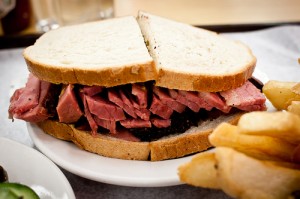 On March 12, Katz’s Delicatessen (Katz’s) filed a trademark infringement and false designation of origin suit against the owners of the food truck Katz &Dogz (K&D) in the Southern District Court of New York.
On March 12, Katz’s Delicatessen (Katz’s) filed a trademark infringement and false designation of origin suit against the owners of the food truck Katz &Dogz (K&D) in the Southern District Court of New York.
According to the complaint, Katz’s contacted the owners of K&D last fall and offered $1,500 to bear the cost of changing the name of their venture and changing the name of their ‘Reuben Orgasm’ sandwich. The offer was raised to $7,000 during the discussion, but the parties did not ultimately reach an agreement, and Katz’s filed a trademark infringement suit.
The Trademarks
Katz’s is the owner of two trademarks, KATZ’S and KATZ’S DELICATESSEN.
KATZ’s is registered in international class 29 for “[f]oods, namely, corned beef, pastrami, salami, frankfurters, knockwurst, knoblewurst, brisket, turkey, roast beef, tongue, Romanian salami, pickles, sauerkraut, Swiss cheese, nova lox, matzoh ball soup, chicken noodle soup, and split pea soup“ and in international class 30 for “[f]oods, namely, mustard, rye bread, Russian dressing, knishes, bagels, bialy, cheesecake, rugelach, babka, and black and white cookies.” While the trademark registration was only issued last year, its first use in commerce was April 1, 1888.
KATZ’S DELICATESSEN is registered in international class 42 for “restaurant services, mail order services featuring food products and catering on and off premise.”
Similar (Yummy) Products
When you register a trademark, you only register it in the classes corresponding to the description of your goods or services. The USPTO uses the International Trademark Classification of Goods and Services established by the WIPO Nice Agreement to classify goods and services when registering a trademark. Using such classifications helps the USPTO determine if similar trademarks are used on similar goods and services.
K&D is a food truck which travels though New York City and also operates a food cart, according to the complaint. K&D sells pastrami, corned beef Reuben sandwiches, hot dogs and knishes to hungry New Yorkers. These foods are also sold at Katz’s as evidenced by the trademark registration, and as known to any visitor of the Houston Street restaurant.
Is Katz’s a Famous Trademark?
Katz’s is known in New York, and outside of New York, as it has often been used as a décor for television shows and movies. It most famously appeared in movie theaters as the place where ‘Sally’ faked an orgasm to prove to ‘Harry’ that women are able to fake them without men noticing it. The complaint mentions that scene, adding that ‘movie aficionados reenact the scene multiple times each week to the amusement of other patrons and employees.’ Call me grumpy, but I prefer to go without movie reenactments while having lunch, but that is not the point. Nor is relevant the fact that I learned from a Katz’s employee years ago how to put French fries and salt in a paper bag and then shake the bag for an even coating throughout all your frites.
Whether or not KATZ’S is a famous trademark will be an issue if the suit goes through, because Katz’s also sued K&D for trademark dilution. The federal Trademark Dilution Act, 15 U.S.C. § 1125(c), allows the owner of a ‘famous mark’ to file for an injunction if another mark “is likely to cause dilution by blurring or dilution by tarnishment of the famous mark, regardless of the presence or absence of actual or likely confusion, of competition, or of actual economic injury.” The Act defines a ‘famous mark’ as a mark “widely recognized by the general consuming public of the United States as a designation of source of the goods or services of the mark’s owner.”
If a mark is ‘famous,’ the owner does not have to prove likelihood of confusion by consumers. That means that even if consumers indeed know that, say, the (fictitious) sparkling beverage ‘Koki-Kalo’ is not manufactured by Coca-Cola, the famous brand would be able to prevent ‘Koki- Kalo’ from using the trademark without having to present any evidence of likelihood of confusion in the market.
Likelihood of Confusion
The Trademark Act, 15 U.S.C. §1114 (1) (a), prevents the use in commerce of a mark so similar with a registered mark that it would be “likely to cause confusion, or to cause mistake, or to deceive.” The owner of the mark suing for trademark infringement must prove that defendant’s use of the mark is likely to create confusion.
One of the exhibits of Katz’s complaint is this post on Twitter, where a user contacted @KatzsDeli, asking if they are indeed behind the Katz and Dogz truck venture.
Trademark law is there to protect the consumers. If consumers are indeed confused as to the origin of a particular product or service, they could make decisions based on inaccurate information. In this case, consumers may believe that Katz’s did indeed jump into the trendy food truck business.
The complaint also points out that one of the sandwiches sold by K&D is ‘The Reuben Orgasm’ and that an ad featured on K&D’s truck asks passersby “Are you ready for the Reuben Orgasm?” which could be another source of confusion for consumers, as Katz’s is associated with the ‘When Harry Met Sally’ scene.
Katz’s is seeking damages in excess of $ 1,000,000. That sum can still buy you lots of sandwiches in New York City.
Image is Katz’s Deli, Pastrami Sandwich, courtesy of Flickr user Kevin Tao pursuant to a CC BY-ND 2.0 license.



